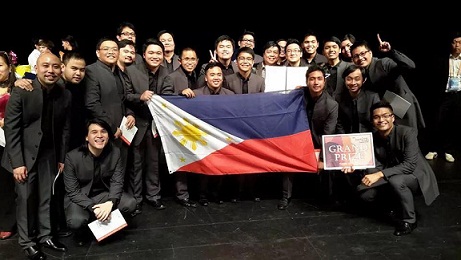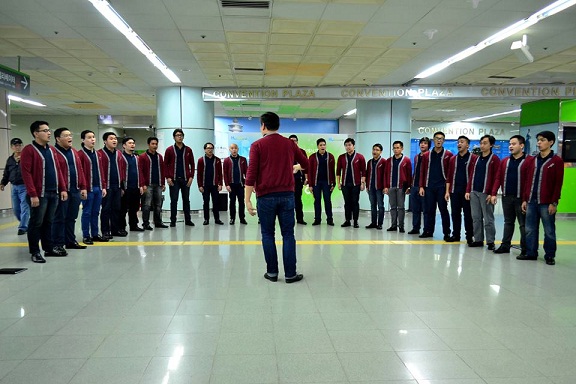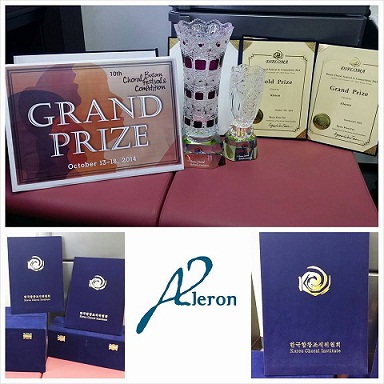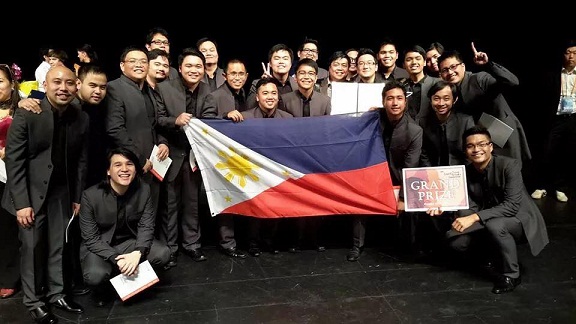
By PABLO A. TARIMAN
“IT takes a lot of diligence and insight from both the conductor and the choristers. It all boils down to finding that meaning in the material and to be able to transfer it through sound that makes a winning performance, whether in a competition or a concert setting.”
Thus said choir conductor Christopher Amado Ong Arceo who led the Aleron all-male choir which received the grand prize in the recently concluded 10th Busan International Choral Festival and Competition in South Korea.
The Philippine choir won over 38 other choirs from eight countries, including Czech Republic, Russia, and Colombia. It won the Gold Prize in the Classical Equal Voices category.
Arceo said everything is the result of hard work. “There is no easy way you can excel and be competitive without the hectic preparations. The preparations are rigorous from training the voice, balancing each section, arriving at an interpretation that each one can own with sincerity, to nurturing their psyche and sustaining their faith in themselves and one another through camaraderie and fellowship. The work never ends until you get the ideal sound. Nurturing a choir is one hell of a difficult job.”
The Aleron choir earlier received the top prize in the Vocal Ensemble category in the 1st Andrea O. Veneracion International Choral Festival held at the CCP in August last year.
The versatility of the Filipino choir was again validated two months ago when the Ateneo Chamber Singers (ACS) was declared champion of the Musica Sacra Category and earned the 2nd Highest Gold Medal for the Mixed Chamber Category at the 8th World Choir Games in Riga, Latvia which attracted approximately 27,000 participants from 400 choirs representing 73 countries.
A triumphant Aleron choir waving Philippine flag after being declared grand prize winner in the 10th Busan choral fest and competition.

The ACS also emerged victorious at the 60th Certamen Internacional de Habaneras y Polyfonia held in Torrevieja, Spain where they won First Prize for the Habaneras Category, the competition’s most coveted prize.
ACS conductor Jonathan Velasco decried Malacañang’s skewed sense of priorities. Prize-winning choirs don’t get congratulatory notes from the President, not even complimentary Malacañang courtesy calls,
“We were winning gold in music Olympics starting in the early 80s but sad to say it is the boxers and beauty queens who get Malacanang’s attention,” added Velasco who started as member of the Philippine Madrigal Singers who won gold in various choral Olympics in the 1980s.
Meanwhile, the Aleron choir conductor is ecstatic about the winning streak of Filipino choirs. “There are so many good choirs in the competition and to have been selected as the grand prize winner certainly provides a sense of validation to our efforts and advocacy as an artistic ensemble.”

Arceo said it was difficult to find out who their closest competitors were. “I wasn’t able to hear all the choirs due to the rigorous competition schedule. But I was very impressed with the Kyungju Children’s Choir from Korea which also qualified for the Grand Prize after winning the Youth Choir Category. They sounded flawless and disciplined.”
The profile of the chorus members was also another big plus.
“I am fortunate to have highly intelligent people in this ensemble. Their curiosity is simply insatiable. Though most of them are amateurs, their fascination with theory, style, pedagogy and literature is mind-boggling. I have several music-majors, some language teachers, businessmen, artists and even pre-med students. All of them are excellent in their own fields,” Arceo added.
The conductor hazards an answer on the state of appreciation of choral music in the country. “It is very hard to answer this question because it really varies from one place to another. Though it is great that choral music remains to be the most popular medium of classical music in the Philippines, rarely do choirs explore what else is possible in designing a concert program. We seem to have plateaued or stagnated in this unfamiliar and familiar dichotomy that doesn’t really best serve our audiences given their diverse tastes and attitudes. On the other hand, I notice that it is not in our culture to be generous in our approval. Hence, I still feel that a Filipino audience’s rousing applause and ovation most gratifying.”
The Busan International Choral Festival and Competition aims to celebrate choral music on an international level, bringing together top tier amateur and student choirs from around the world for a grand festival in Busan, South Korea. The jury this year included expert musicians from all parts of the globe, including Mark Anthony A. Carpio, choirmaster of the prize-winning Philippine Madrigal Singers.
